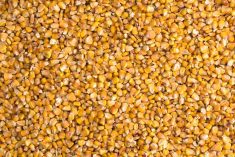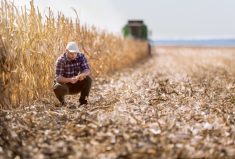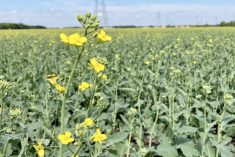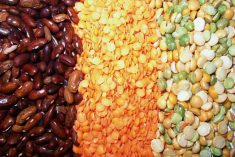In agriculture today, some see only the negative and the naysayers when it comes to “ag awareness.” Dave Baute and Stephen Denys see opportunity, and they’re building a partnership they hope can break down barriers and create new information channels between those in the country and those in cities and towns.
“Be Rooted. Be Involved” is a social licence initiative launched by Maizex Seeds during Canada’s Outdoor Farm Show. It comes out of Baute’s and Denys’ discussions with the public over the use of neonicotinoid-based seed treatments, and the restrictions which farmers had to deal with earlier this year. Both were critical of government and special interest groups concerning the use of the seed treatments. At the same time, they also acknowledge it’s only part of a broader challenge to agriculture.
Read Also

Dryness poised to threaten Saskatchewan crops
Crops in Saskatchewan are developing in opposite directions, the province’s latest crop report said. Growing conditions in the province vary, with some areas receiving enough rain while other locations are experiencing crop stress due to hot, dry conditions.
“What we wanted to do was to complement all of the other efforts, including Ag More than Ever and Farm and Food Care,” said Denys, Maizex’s director of business management. “We wanted to complement by energizing our customer base and other farmers right across the spectrum to get out and tell their own story.
“We need farmers to feel knowledgeable in what they’re doing on their own farms, and to take that knowledge and start to have those discussions with their relatives and friends, and people at church and at the restaurants and the grocery stores.”
The first part of the initiative — “Be Rooted” — is meant to ensure farmers are fully engaged in establishing that base of knowledge of what they do on their farms, from their use of seed treatments to nutrient management to genetic modifications in seed. The second part — “Be Involved” — entails taking that knowledge and engaging non-farmers within farmers’ circles of friends, relatives and acquaintances.
“We have one per cent producing for 99 per cent, and if we look at it historically, even 60 or 70 years ago, you had 50 per cent of the population that was only one generation removed from the farm,” said Denys. “Now you have the vast majority of the population that’s two, three and even four generations removed from the farm, and they have no concept. That’s where we need farmers to share their story.”
Baute, Maizex’s president, agreed many people are unaware of what happens on the farm, particularly from a scientific perspective. But they’re also more keenly aware of the importance of how their food is produced.
“There is an opportunity there for us — as farmers and primary producers — to be engaged with them, and hopefully alleviate some of their concerns around the technology that we use every day, and why we use it, and the positive impacts it has,” he said.
Baute said he’s found most people he’s talked to — from relatives in a city to fellow travellers on an airplane — are curious, open-minded and really just looking for information.
To that end, Maizex has set up a website including an education circular to help farmers to formulate their stories. It can also be distributed to those who may have questions about farming practices.
— Ralph Pearce is a field editor for Country Guide at St. Marys, Ont. Follow him at @arpee_AG on Twitter.
















